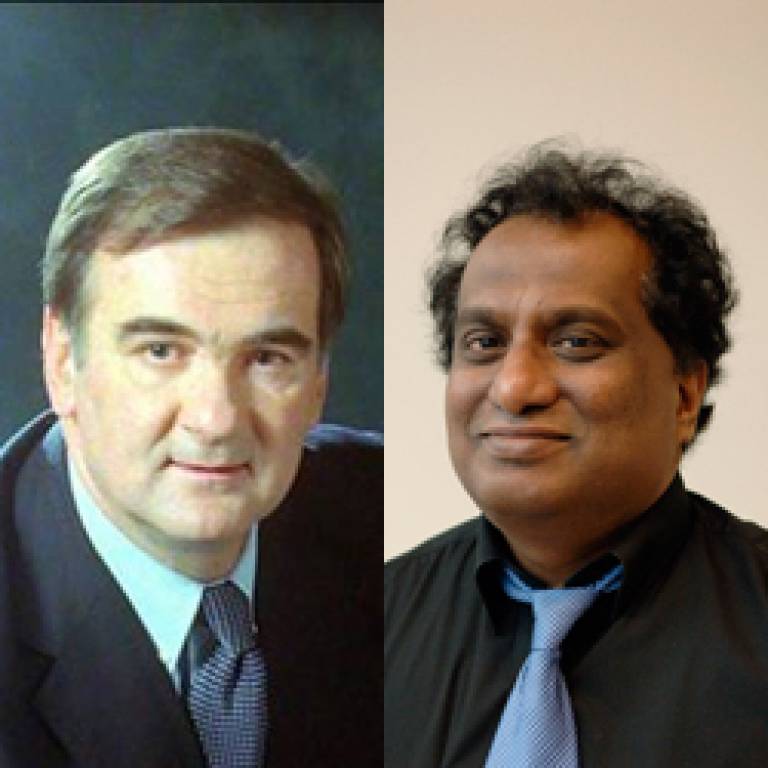Wolfson Royal Society scheme grants £500,000 for lab refurbishments
18 January 2007
UCL academics have been successful in two bids for grants from the Royal Society Wolfson Laboratory Refurbishment Scheme for new tissue engineering facilities.

Professor Agostino Pierro, Head of Surgery Unit at the UCL Institute of Child Health, and Professor Mohan Edirisinghe, UCL Mechanical Engineering, led teams that successfully bid for grants with a combined total of £500,000.
A grant of £250,000 was awarded to Professor Pierro's team to create state-of-the-art tissue engineering laboratories through the refurbishment of existing facilities at the UCL Institute of Child Health. These will house the Gut Tissue Engineering Research Group, made up of five distinct teams within UCL (Paediatric Surgery, Muscle Tissue, Neural and Epithelial Tissue, Biomaterials, and Functional Integrity), each with specific roles.
The group's main focus is to develop novel therapies, through tissue engineering, for a number of disorders in children and adults characterised by functional failure of the gastrointestinal tract. The overall work of all members of the group is integrated, but to date has been carried out in physically separate laboratories and buildings within UCL. This has impeded the development of the group's work and thus the overall aim of the refurbishment grant is to house the entire group within the same laboratory area to facilitate a more seamless tissue engineering capability.
Professor Pierro said: "The overall aim of our work in the Gut Tissue Engineering Research Group is to generate intestine for patients with intestinal failure and alleviate the need for long-term parenteral nutrition [such as drip-feeding] or intestinal transplantation. To achieve this goal we intend to develop a programme of intestinal tissue engineering utilising our combined multidisciplinary expertise."
He added: "Being based at the ICH is especially valuable given the intimate proximity of Great Ormond Street Hospital, an internationally renowned centre for the treatment of children suffering from severe gastrointestinal disorders."
Professor Edirisinghe's bid was for £250,000 for physical renovation and modernisation of tissue engineering research laboratories in UCL Mechanical Engineering. This includes the creation and/or upgrading of laboratories for Biological and Functional Materials Processing, Biomedical Materials, Biophysics, Biomechanics, Biofluids and Biomedical Ultrasonics, and will underpin the research activities of Professor Edirisinghe and six 'new-blood' lecturers. All seven have been appointed to UCL Mechanical Engineering in the last 18 months.
Professor Edirisinghe said: "A whole series of collaborative tissue engineering research projects will be carried out in the new laboratories starting this year. We shall explore novel preparation, characterisation and testing of a new generation of scaffolds (supporting matrices), which will provide fast healing, tissue regeneration and help in the development of organs such as heart valves, liver, intestines and so on. A range of advanced nanostructured biomaterials and the creation of yet-unexplored scaffold geometries will be at the heart of our research."
As part of this work, biosprays containing living cells will be applied to engineer cellular arrays and to develop novel biotechnologies - for example to detect cellular disorders. The effect of mechanical loads and flow on tissue growth will be modelled and tested, with findings used to create tissue-engineered prototypes, which will be tested for performance and durability. Ultrasound systems will be developed for characterising and regulating tissue engineering processes such as micro-channel formation, and for developing equipment, automated fabrication of tissue constructs and in-vivo monitoring.
In addition, the new laboratories at UCL Mechanical Engineering will house the research projects of a new, interdisciplinary MSc course in Biomaterials & Tissue Engineering, which will start in September 2007. The course will spearhead postgraduate research education on a broader front, inviting applicants from physical and life sciences, engineering and medicine, and serving the healthcare services and industries. Professor Edirisinghe has already secured £180,000 from the Engineering & Physical Sciences Research Council's collaborative training account funding to offer over 50 fees studentships from 2007-11.
Image: Professors Pierro (left) and Edirisinghe.
 Close
Close

